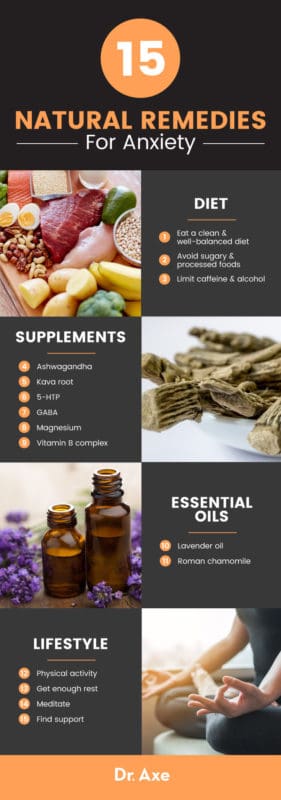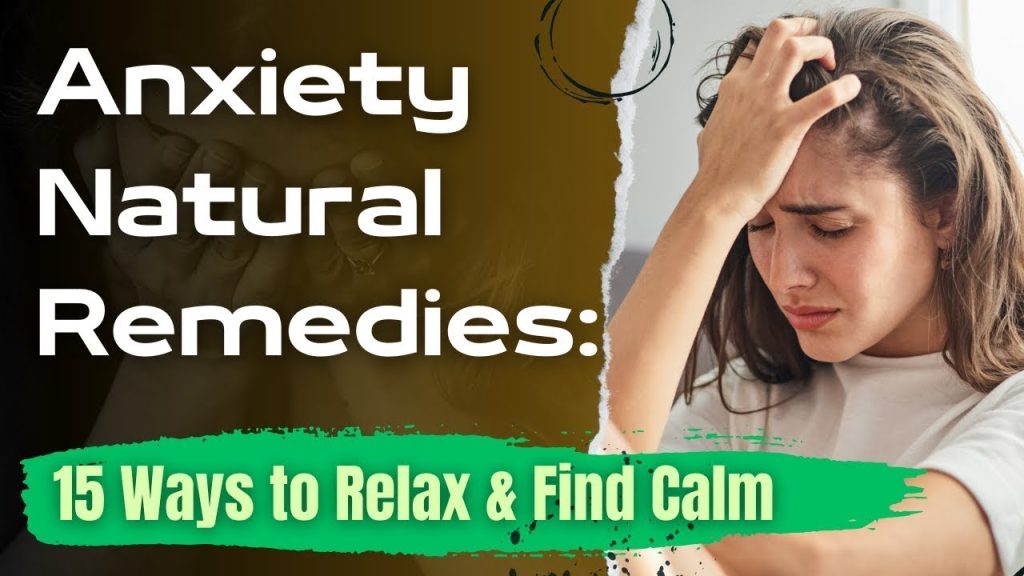Anxiety is a common mental health issue that affects millions of people in the United States. While it’s normal to feel anxious in certain situations, when it becomes constant and interferes with daily life, it can be debilitating. Fortunately, there are several natural remedies that can help manage anxiety effectively. These options are not only safe but also backed by science, making them a great alternative to medication.
In this article, we will explore five effective natural remedies for anxiety relief, including exercise, deep breathing, herbal remedies, nutrition, and social support. We will also discuss other complementary treatments like kava kava and St. John’s Wort, as well as the importance of consulting a healthcare professional before trying any new remedy.
1. Exercise: A Powerful Tool for Anxiety Relief
Exercise is one of the most effective natural remedies for anxiety. Physical activity helps release endorphins, which are chemicals in the brain that act as natural painkillers and mood elevators. Regular exercise can significantly reduce stress and anxiety levels, improve sleep, and boost overall well-being.
According to research, even simple activities like walking, biking, or dancing can provide quick relief from anxiety. A study showed that just two days of aerobic exercise per week reduced stress in college students. Whether it’s a 15-minute walk or a full workout session, incorporating physical activity into your routine can have long-term benefits for your mental health.
Key Benefits of Exercise for Anxiety:
– Lowers cortisol, the stress hormone
– Increases mood-boosting endorphins
– Improves sleep quality
– Builds mental resilience to stress
– Enhances energy and focus
If you’re unsure where to start, try a brisk walk, a quick jog, or follow an online workout. The key is consistency and finding an activity you enjoy.
2. Deep Breathing and Mindfulness: Calm Your Mind Instantly
When anxiety strikes, focusing on your breath can help calm your mind and body. Deep breathing exercises send a signal to your brain to relax, slowing your heart rate and easing tension. This technique is simple, free, and highly effective.
Some popular techniques include diaphragmatic breathing, box breathing, and alternate nostril breathing. Mindfulness meditation is another powerful tool that helps you stay present and reduce anxious thoughts.
How Deep Breathing Helps:
– Reduces cortisol levels
– Lowers heart rate
– Promotes relaxation
– Improves sleep quality
– Enhances emotional regulation
A review found that regular deep breathing can significantly reduce anxiety, lower cortisol, and improve sleep. Incorporating these practices into your daily routine can help manage anxiety in the moment and build long-term resilience.
3. Herbal Remedies: Nature’s Calming Effects
Herbal remedies have been used for centuries to treat anxiety and promote relaxation. Some herbs, such as chamomile, lavender, passion flower, and lemon balm, have calming effects on the brain and body. However, it’s important to note that these remedies are not regulated like medications, so quality can vary.
Common Herbal Remedies for Anxiety:
– Chamomile: Known for its calming effects, often consumed as tea.
– Lavender: Used in oils, capsules, or teas to promote relaxation.
– Passion Flower: May help lower anxiety levels, though some people report dizziness or sleepiness.
– Lemon Balm: Shown to reduce nervousness and excitability.
While these herbs can offer quick relief, they should be used cautiously and under the guidance of a healthcare professional, especially if you’re taking other medications.
4. Nutrition and Supplements: Fuel Your Body for Mental Health
What you eat plays a significant role in how you feel mentally and emotionally. A diet rich in whole foods, such as fruits, vegetables, nuts, seeds, beans, and fish, can help regulate mood and reduce anxiety. On the other hand, processed foods and excessive sugar intake may increase stress and anxiety levels.
Key Nutrients for Anxiety Relief:
– Magnesium: Supports brain function and reduces stress.
– B Vitamins: Help regulate mood and support the nervous system.
– Omega-3 Fatty Acids: Found in fish and flaxseeds, these can improve brain health and reduce anxiety.
Some people turn to supplements like magnesium or SAMe for additional support. However, it’s important to consult a healthcare provider before starting any supplement regimen, as they may interact with other medications.
5. Social and Sensory Support: Connect for Comfort
Connecting with others and engaging your senses can quickly calm your mind. Simple actions like hugging a loved one, talking to a friend, or spending time with a pet can release oxytocin, a hormone that lowers stress and brings comfort.
Ways to Use Social and Sensory Support:
– Spend time with family or friends
– Cuddle or hug to reduce heart rate and cortisol
– Play with pets to boost mood and lower blood pressure
– Use calming scents like lavender or chamomile
– Get outdoors for fresh air and nature exposure
These small moments can provide fast relief from anxious thoughts and remind your brain and body that you are safe.
Other Complementary Treatments for Anxiety
In addition to the remedies discussed above, there are other complementary treatments that may help manage anxiety. Natural medicine practitioners often use herbs like kava kava and St. John’s Wort, though the FDA has issued warnings about kava kava due to potential liver damage. Valerian root is another herb known for its calming effects.
Other Natural Treatments:
– SAMe (S-adenosylmethionine): A dietary supplement that has been used in treating anxiety.
– Eliminating Caffeine and Alcohol: Reducing intake of stimulants can help lessen anxiety symptoms.
– Relaxation Techniques: Practices like yoga, tai chi, and progressive relaxation can ease anxiety.
It’s essential to consult a healthcare professional before trying any new treatment, especially if you have a medical condition or are taking medications.
Final Thoughts: Embrace Natural Remedies for Anxiety Relief
Managing anxiety doesn’t always require a prescription. Simple, natural remedies like exercise, deep breathing, herbal teas, and connecting with loved ones can provide quick relief and contribute to long-term mental well-being. Incorporating these habits into your routine can make a big difference in reducing anxiety.
Have you tried any of these natural remedies? Share your experiences and let us know what works best for you. Stay updated with the latest news and insights on anxiety management and mental health.
Author: Sarah Mitchell
Title/Role: Mental Health Writer and Wellness Advocate
Credentials: Sarah has over 10 years of experience in mental health advocacy and wellness education. She specializes in writing about natural remedies, mindfulness, and holistic approaches to mental well-being.
Profile Link: https://www.sarahmitchellwellness.com
Sources:
1. National Institute of Mental Health (NIMH) – https://www.nimh.nih.gov
2. Mayo Clinic – https://www.mayoclinic.org
3. Harvard T.H. Chan School of Public Health – https://www.hsph.harvard.edu
Internal Links:
1. Understanding Anxiety Disorders
2. The Role of Diet in Mental Health
3. Mindfulness Practices for Stress Relief
Featured Snippet:
Natural remedies for anxiety include exercise, deep breathing, herbal teas, and social support. These methods are backed by science and can provide quick relief without the need for medication.
Call to Action:
Stay updated with the latest news and insights on anxiety management and mental health. Explore today’s headlines and discover more ways to live a balanced, stress-free life.
URL Slug: /natural-remedies-for-anxiety-relief
Image Optimization:
– 
–
– 
–
– 











More Stories
US Trending News: The History and Legacy of Zoo York in Streetwear Culture
What Is Yodo Para Tiroides and How Does It Affect Thyroid Health?
Understanding ‘You Got That Right’ in The New York Times: Context and Implications